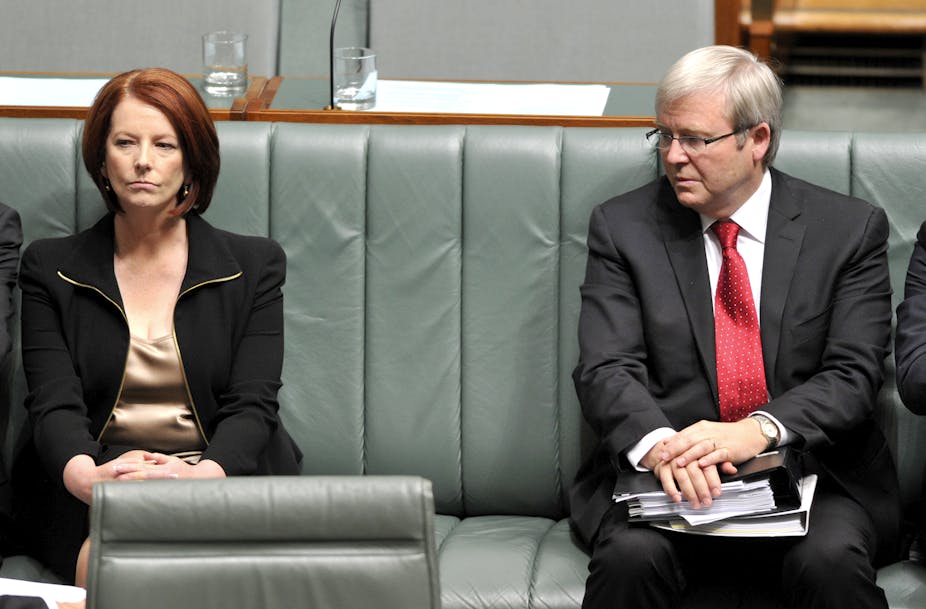Prime Minister Julia Gillard announced this morning that she will hold a leadership ballot at 10am on Monday, to “settle once and for all” Labor’s escalating leadership crisis.
Kevin Rudd has not formally announced his leadership intentions, telling a Washington press conference he’ll do so on return to Australia. But the members of the Labor caucus will have to vote on Monday for their leader, and to back down from standing now would show weakness.
The Conversation spoke with constitutional expert Anne Twomey about the different parliamentary scenarios that could arise from a leadership spill on Monday.
Can you explain the different constitutional consequences in a hung parliament after a leadership spill?
If Julia Gillard wins, then from a constitutional point of view there are no further issues. She would remain Prime Minister. It becomes more complicated, however, if Kevin Rudd or someone else wins.
What will Julia Gillard do in that circumstance? There’s three possibilities open to her, she could a) do nothing b) advise the governor-general to hold an election or c) resign as Prime Minister.
Now all of those lead to interesting different complications but the Prime Minister has publicly stated that she will resign if she loses the ballot on Monday so the third is the most likely scenario.
What about that scenario where Rudd wins and Julia resigns?
This leads to interesting constitutional questions for the governor-general as to who to appoint as prime minister to replace her. It’s not a fait acomplit that she would appoint whoever won the leadership ballot. Constitutional convention requires her to appoint the person who is most likely to hold the support of a majority of the House of Representatives. Who that person is, will depend upon the independents.
If Rudd got the support of the independents, he could continue to govern without an election if the governor-general appointed him as Prime Minister. But he could also face a vote of no-confidence on the floor of parliament, which he would need to survive to keep on governing.
What if he can’t get the cross-benchers’ support?
If the support of the cross-benchers is unknown or unclear, the governor-general could defer making a decision on a new Prime Minister and leave it to the floor of the parliament to decide in whom it has confidence.
A parliamentary vote is the clearest and most democratic evidence of the support of the House. It would avoid any suggestion of bias or the exercise of discretion on the part of the governor-general and maintain the independence of her office.
What about if the independents support Tony Abbott?
If the independents didn’t support the winner of the ballot and did show support for the leader of the opposition, then the governor-general could indeed choose the leader of the opposition to form a government. And then the most likely outcome would be for the leader of the opposition to advise the governor-general to call an election.
Really it’s up to the independents. If they decided that an election would be the best thing for the country, they could support Tony Abbott and once he became Prime Minister, he would most likely seek an election. However, the independents have a very strong self-interest in keeping the government going, because as soon as an election is held, some may well lose their seats, and those that survive will lose their importance if there is a new majority government.
On that basis, it’s fairly likely that they would want to retain the current government, whoever the leader is. On the other hand, the thing about independents is they are independently-minded and somewhat eccentric. That means predicting their behaviour, apart from self-interest, is rather difficult.
Can you recall a period in constitutional history in which we’ve seen similar circumstances arise?
It’s quite difficult to think of something exactly on par. There have been some examples of parliamentary leaders losing the support of their party before, but normally the party is in a clear majority, as was the case with Joh Bjelke-Petersen’s government.
Probably the closer examples would have occurred during World War I, when the Labor party split over conscription. And in that circumstance, in NSW and at the national level, the Prime Minister and Premier lost the support of their party but still managed to continue in office.
But in those circumstances you had a war, and there was a very strong motive for parties to join together in a united government to support the war effort. That’s how Holman survived in NSW, and Billy Hughes jumped ship and joined with the opposition party at the national level.
Today we have a very different position with the dangerous combination of minority government, unpredictable independents and leadership instability.
It’s a potentially explosive situation.

